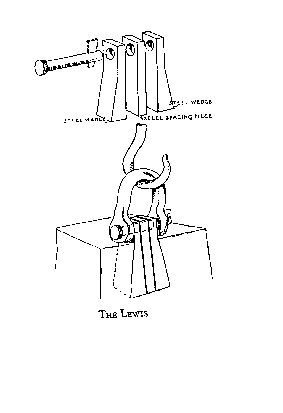THE LEWIS
Question:
What is a Lewis?
What part does it play in Masonry?
What is a Lewis?
It is an instrument in Operative Masonry. It is an
Iron Cramp, which is inserted into a cavity prepared for that purpose so that
large stones may be raised to any height, by rope and pulley. The stone is then
placed in it's proper position. This implement was known to the Romans and
several were taken from old ruins and are now in the Vatican. In the ruins of
Whitby Abbey in England which was founded by "Oswy" King of
Northumberland in 658, large stones were discovered with the necessary
excavation for the insertion of a Lewis.
Where did the word come from?

Probably from the old French word
"L…WIS" meaning "any contrivance for lifting". In the
English system of Masonry, the "LEWIS" is found on the
Tracing-board of the Entered Apprentice, where it is used as a symbol of
"STRENGTH", (English Constitution) because by it's assistance the
heaviest of stones can be lifted with comparatively little exertion. The son of
a Mason in England is called a "Lewis", because it is his duty to support
the sinking power and aid the failing strength of his father.
Or as Dr. Oliver has put it "To bare the burden in
the heat of the day that his Parents may rest in their old age, thus rendering
the evening of their lives peaceful and happy."
In Browns "Master Key" which is supposed to
represent the Prestonian Lecture we find the following:
Question What do we call the son of a Freemason ?
Answer A Lewis
Question What does that denote?
Answer Strength
Question How is a Lewis depicted in a Masonic Lodge?
Answer As a cramp of metal, by which, when fixed into a stone, great and
ponderous weights are raised to a certain height, fixed on their proper bases,
without which Operative Masons could not so conveniently do.
Question What is the duty of a Lewis to his aged parents?
Answer To be made a Mason before any other person, however dignified by birth,
rank or riches, unless he by complaisance waives this privilege.
The term occurs in this sense in the constitutions
of 1735 at the end of the Deputy Grand Masters song, in allusion to the expected
birth of George III son of Frederick Prince of Wales.
"May a Lewis be born whom the whole may
admire;
Serene as his mother, august of his
sire."
back to top | ![]()






